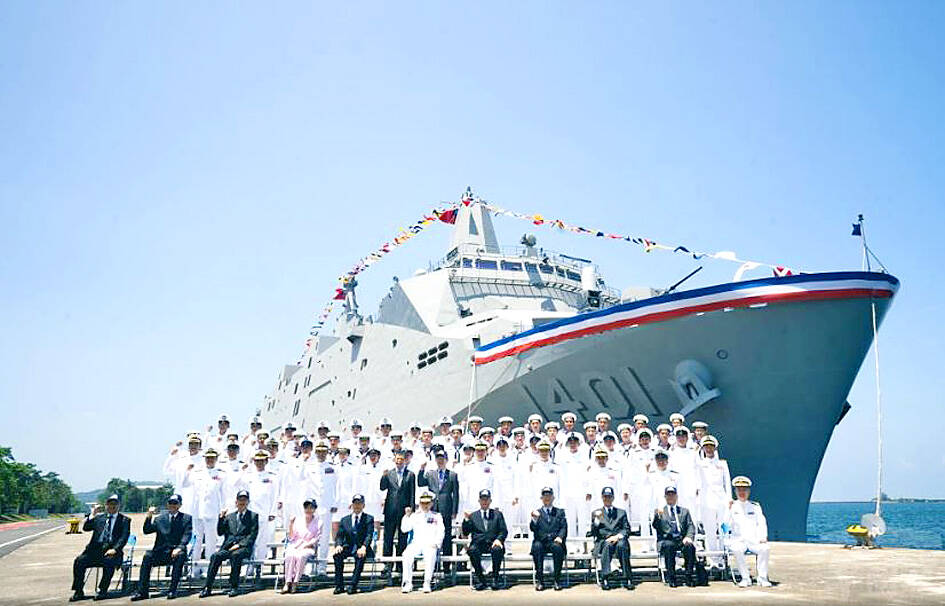Navy Commander Admiral Tang Hua (唐華) yesterday morning presided over the commissioning of a new domestically developed landing platform dock, the Yushan.
The Yushan, which would be used to transport amphibious vehicles and other landing craft, is replacing the Hsu Hai dock landing ship, which entered service in 1999.
Unlike during past commissioning ceremonies, yesterday’s was closed to the public and was only covered by the Military News Agency, which issued a news release afterward.

Photo: screen grab from Military News Agency’s Web site
Tang handed over the national flag and the ship’s seal to its first captain at the ceremony at Kaohsiung’s Zuoying (左營) naval base.
He said the Yushan was a “new type of amphibious combat ship” that was designed specifically to meet the navy’s evolving operational needs.
During construction, the Yushan went under the code name “Hongyun Project” (鴻運計畫), which referred to the safety and smoothness of the operation that engineers prioritized during the design process, Tang said.
The name Yushan was chosen as it is the name of the highest peak in Taiwan, and represents the “determination of the navy to always stand on the front line in defending the country and its territorial waters,” he said.
Officers from the Marine Corps also attended the ceremony, symbolizing the important role the ship would play in the operations of the navy and the Marine Corps, he said.
“The two branches of the military will jointly assume the responsibility of defending the Taiwan Strait, and together will form a maritime defense force,” he said. “The officers aboard the Yushan are to cooperate closely with the Marine Corps.”
The ship is 153m long and 23m wide, and has a full-load displacement of 10,600 tonnes and a top speed of more than 20 knots (37kph).
It has a loading dock at its stern, from which it can load amphibious armed personnel carriers and troops, and can also be equipped with autocannons and anti-aircraft missile systems.

A magnitude 5.6 earthquake struck off the coast of Yilan County at 12:37pm today, with clear shaking felt across much of northern Taiwan. There were no immediate reports of damage. The epicenter of the quake was 16.9km east-southeast of Yilan County Hall offshore at a depth of 66.8km, Central Weather Administration (CWA) data showed. The maximum intensity registered at a 4 in Yilan County’s Nanao Township (南澳) on Taiwan’s seven-tier scale. Other parts of Yilan, as well as certain areas of Hualien County, Taipei, New Taipei City, Taoyuan, Hsinchu County, Taichung and Miaoli County, recorded intensities of 3. Residents of Yilan County and Taipei received

Taiwan has secured another breakthrough in fruit exports, with jujubes, dragon fruit and lychees approved for shipment to the EU, the Ministry of Agriculture said yesterday. The Animal and Plant Health Inspection Agency on Thursday received formal notification of the approval from the EU, the ministry said, adding that the decision was expected to expand Taiwanese fruit producers’ access to high-end European markets. Taiwan exported 126 tonnes of lychees last year, valued at US$1.48 million, with Japan accounting for 102 tonnes. Other export destinations included New Zealand, Hong Kong, the US and Australia, ministry data showed. Jujube exports totaled 103 tonnes, valued at

TRUST: The KMT said it respected the US’ timing and considerations, and hoped it would continue to honor its commitments to helping Taiwan bolster its defenses and deterrence US President Donald Trump is delaying a multibillion-dollar arms sale to Taiwan to ensure his visit to Beijing is successful, a New York Times report said. The weapons sales package has stalled in the US Department of State, the report said, citing US officials it did not identify. The White House has told agencies not to push forward ahead of Trump’s meeting with Chinese President Xi Jinping (習近平), it said. The two last month held a phone call to discuss trade and geopolitical flashpoints ahead of the summit. Xi raised the Taiwan issue and urged the US to handle arms sales to

BIG SPENDERS: Foreign investors bought the most Taiwan equities since 2005, signaling confidence that an AI boom would continue to benefit chipmakers Taiwan Semiconductor Manufacturing Co’s (TSMC, 台積電) market capitalization swelled to US$2 trillion for the first time following a 4.25 percent rally in its American depositary receipts (ADR) overnight, putting the world’s biggest contract chipmaker sixth on the list of the world’s biggest companies by market capitalization, just behind Amazon.com Inc. The site CompaniesMarketcap.com ranked TSMC ahead of Saudi Aramco and Meta Platforms Inc. The Taiwanese company’s ADRs on Tuesday surged to US$385.75 on the New York Stock Exchange, as strong demand for artificial intelligence (AI) applications led to chip supply constraints and boost revenue growth to record-breaking levels. Each TSMC ADR represents